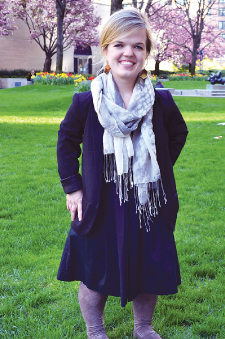Throughout college and the few years after, Andrea Gervais aimed for a career in health and medicine. She majored in genetics at the University of Minnesota and then came to New York to work as a public health researcher, studying the impact of prenatal care and pregnancy education on the lives of pregnant teens in Brooklyn and the Bronx.

Photo by Chaewon Seo
And it was then that her ambitions changed.
After seeing the difference that the right information and support made for vulnerable young women, she was turned on to something new—in her words, “working with young people and being involved in education, and someone’s well-being.”
She decided to become a teacher, and today she is graduating with a master’s in teaching, along with certifications in biology and special education, from the Graduate School of Education. During the past semester she also worked full-time as a science and special education teacher at the Urban Assembly School for Law and Justice, a public high school in Brooklyn.
She co-teaches classes in forensics, biology, chemistry, and algebra. And she is particularly enthusiastic about one key duty: giving extra help to her students who have learning disabilities so they can thrive in general-education classrooms, rather than being isolated in a classroom of their own.
“That’s a part of my job that I think is so fantastic,” she said. “If I can provide opportunities for students with disabilities to gain access to this material in this setting, then I can come home at the end of the day and say, ‘Okay, today was a good day. I did some good things today.’”
Gervais followed a circuitous route to her teaching career. A Minnesota native, she enrolled at the University of Minnesota with the goal of becoming a nutritionist, but the required biology courses stoked her interest in genetics. She had always been interested in the field because of the dwarfism she was born with, and decided to make it her major. Her plan to go into genetic counseling led her to seek the position with the Yale School of Public Health, working on the aforementioned study on pregnancy education and teens.
This summer she has plans for an educational internship at the Wildlife Conservation Society/Bronx Zoo, part of the Noyce Scholarship Program that GSE associate professor John Craven, Ph.D., put her in touch with. Next fall, she hopes to inaugurate an after-school research club that exposes students to the joys of scientific experimentation.
Gervais has already made her mark on the biology curriculum at her high school by developing a unit that presents students with a challenging hypothetical question: should parents who are deaf be allowed to use genetic technologies to select for babies who are also deaf? Students had to make an argument either way.
Students responded well to the unit, designed to engage students in science by showing them that “it can be discussion-based, [and]it can pose really interesting questions,” she said.
Now that Gervais has her degree, she expects to have added responsibilities, “implementing strategies and tools to really assist those students who are struggling.”
